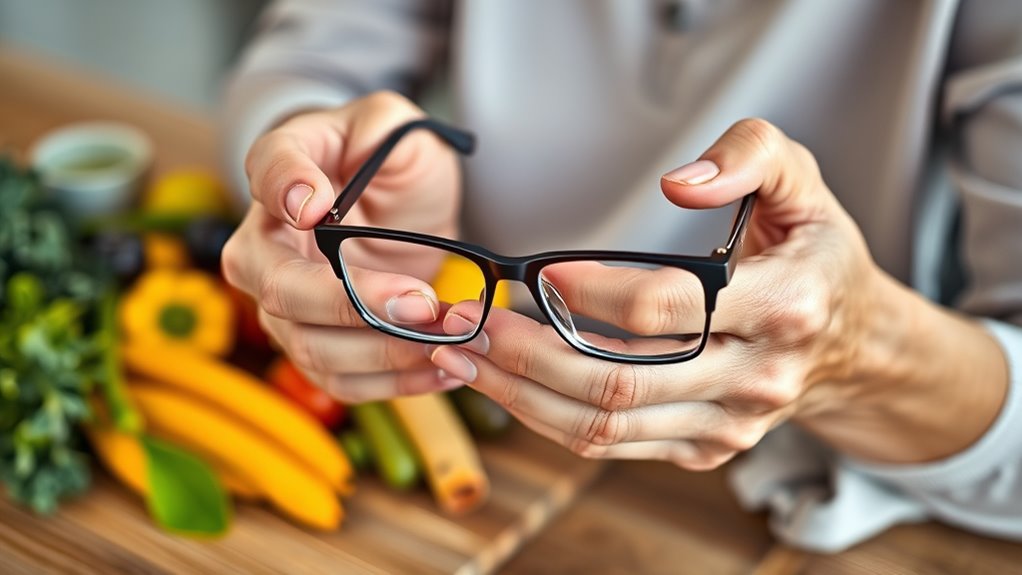To protect your eyes after 40, focus on maintaining healthy habits like wearing UV-protective sunglasses, taking regular breaks from screens, and ensuring proper lighting. Incorporate eye exercises and blinking often to reduce fatigue and strain. Eating foods high in nutrients like lutein, zeaxanthin, and vitamins supports long-term eye health. Regular checkups help detect issues early, and managing overall health boosts your vision. Keep going to discover more ways to keep your eyesight sharp.
Key Takeaways
- Schedule regular eye exams to detect early signs of age-related eye conditions.
- Incorporate eye exercises and focus techniques to maintain eye muscle strength and flexibility.
- Use proper lighting and limit screen time to reduce eye strain and fatigue.
- Consume nutrients like lutein, zeaxanthin, and vitamins to support retinal health.
- Protect eyes from UV rays with sunglasses and manage overall health factors affecting vision.

As you reach your 40s, maintaining good vision becomes more important than ever, since age-related changes can affect your eyesight. You might notice that reading small print becomes a bit more challenging, or that your eyes tire more quickly after prolonged focus. To help protect your vision, incorporating simple habits like eye exercises and considering vision supplements can make a significant difference. Eye exercises are designed to strengthen the muscles around your eyes, improve flexibility, and reduce eye strain. For example, practicing focusing techniques—such as shifting your gaze from near to far objects—can help keep your eye muscles active and responsive. Regularly blinking and performing gentle eye rolls can also alleviate dryness and fatigue, especially if you spend hours staring at screens. These exercises are easy to integrate into your daily routine and can be done anywhere, providing a proactive way to support your eye health. Additionally, using proper lighting when reading or working can further reduce eye strain and prevent long-term damage. Incorporating advanced machine learning algorithms that analyze your visual habits can also assist in early detection of potential issues. Studies show that real-time analytics powered by advanced machine learning algorithms can help detect early signs of vision problems through data collected from smart devices, enabling timely intervention. In addition to eye exercises, exploring vision supplements can further safeguard your eyesight. Supplements containing nutrients like lutein, zeaxanthin, vitamin C, vitamin E, and zinc are known to support eye health and may slow age-related decline. Lutein and zeaxanthin, in particular, act as antioxidants, filtering harmful blue light and reducing oxidative stress on your retinal cells. Taking these supplements regularly, along with maintaining a balanced diet rich in leafy greens, colorful fruits, and omega-3 fatty acids, can bolster your eyes’ resilience against age-related conditions such as macular degeneration and cataracts. Before starting any new supplement, it’s wise to consult your healthcare provider to confirm they’re appropriate for your specific needs. Protecting your vision after 40 also includes making lifestyle adjustments. Wearing sunglasses that block UV rays, taking regular breaks from screens, and ensuring proper lighting when reading can all help reduce eye strain and prevent damage. Maintaining good overall health is vital, too—managing blood pressure, controlling blood sugar levels, and avoiding smoking contribute to healthier eyes in the long run. Grocery savings strategies such as buying in bulk and using coupons can help you allocate more resources toward eye health products and supplements. Regular eye checkups become even more critical at this stage; they allow your eye specialist to detect early signs of issues and recommend personalized strategies for maintaining peak vision. With a combination of targeted eye exercises, appropriate supplements, and healthy habits, you can preserve your eyesight and enjoy clear, comfortable vision well into your later years.
Frequently Asked Questions
How Often Should I Get My Eyes Checked After 40?
You should schedule eye health and vision screenings every one to two years after turning 40. Regular checkups help detect early signs of common age-related issues like presbyopia or glaucoma. If you wear glasses or contacts, or notice changes in your vision, you might need more frequent visits. Staying on top of your eye health guarantees you catch problems early and maintain clear vision as you age.
Can Diet Alone Prevent Age-Related Vision Problems?
Imagine your eyes as delicate gardens needing nourishment. While eating eye-healthy foods rich in antioxidants and omega-3s helps, diet alone can’t prevent age-related vision problems. Nutritional supplements can fill in gaps, but regular eye exams are essential for early detection. Combining a balanced diet with supplements and professional checkups offers the best protection for your vision as you age.
Are There Specific Exercises to Improve Eyesight After 40?
You might wonder if specific exercises can improve your eyesight after 40. While they can’t reverse age-related changes, eye relaxation and vision exercises can help reduce eye strain and improve focus. Try simple practices like focusing on distant objects, blinking frequently, and eye rolling. Incorporate these exercises into your daily routine to support overall eye health and keep your vision more comfortable and clear over time.
What Are Early Signs of Age-Related Macular Degeneration?
Ironically, eye problems often whisper before they shout, and with age-related macular degeneration, those whispers are vision changes like blurred central vision or difficulty recognizing faces. You might notice dark spots or straight lines appearing crooked, which are early signs of macular degeneration. Catching these subtle clues early can help preserve your sight longer. Keep an eye out for these signs, because ignoring them might let vision fade unexpectedly.
Do Sunglasses Prevent Age-Related Eye Damage?
Sunglasses do help prevent age-related eye damage by providing UV protection, which is essential as you age. Look for sunglasses with advanced lens technology that blocks 100% of UVA and UVB rays. Wearing sunglasses regularly shields your eyes from harmful rays that can contribute to conditions like cataracts and macular degeneration. So, yes, investing in quality sunglasses is a smart move to preserve your eye health over time.
Conclusion
Taking care of your eyes after 40 is like tending a delicate garden—regular checkups and healthy habits nurture your vision, helping it flourish for years to come. Don’t let neglect cast shadows on your world; instead, protect your sight like a precious gem. With mindful choices, you’re the gardener of your vision’s future, ensuring that your eyes remain bright and vibrant, illuminating every moment with clarity and color.









